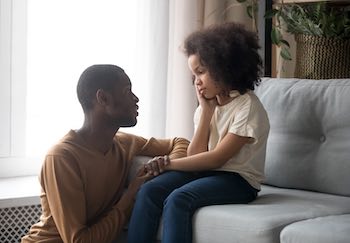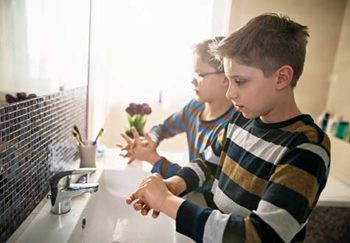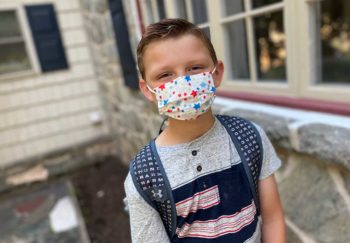
The coronavirus (COVID-19) pandemic is a challenging time for all of us. There’s always something in the news about it. And kids’ questions about COVID-19 can be just as hard to answer. Infectious disease pediatrician Debbie-Ann Shirley, MD, stresses that children may feel anxious about what they’re hearing and seeing around them. How do you answer their questions?
Shirley reminds parents they can help their kids feel better by talking openly about what’s happening. Use language that is easy for them to understand.
A Basic Understanding of COVID-19
First, the basics — germs. Germs can be hard for little kids to understand since they can’t see them. “Germs are tiny living beings that are so small that we need special microscopes to see them. A virus is a type of germ that needs to live inside of people or animals to survive,” Shirley says.
When a virus enters the body, it can make copies of itself and make us sick.
Infectious disease doctor Shannon Moonah, MD, shares a scenario if your kids are asking questions: “Think of germs as tiny little invaders that sneak into our body. The amazing thing is that our body has an entire army, called an immune system. This army is ready and waiting to help defend against these intruders so that we can get better.”
There is a family of different coronaviruses that can make you sick with the common cold. This particular coronavirus, COVID-19, is new to us and recently discovered. The first cases of this virus were reported in China, but it quickly spread around the entire world. Scientists are still unsure how it started. Some believe the virus started with a bat. Then the virus jumped to another animal before making people sick.
People who are sick with COVID-19 can have a fever, cough, or a hard time breathing. They can also feel tired, achy, and lose their appetite.
Since this is new, we don’t have a vaccine yet to prevent people from getting sick or medication to help people feel better. Most people get better on their own, but some people get sicker and need to go to the hospital. Shirley assures us that scientists are busy working on both a cure and vaccine.
Q&A With Kids
We asked people to submit questions from their kids. These were some of them.
“Why does it make some people so much sicker than other people?” — From a 7-Year-Old
Shirley says that doctors aren’t sure why this is happening, but older people or people with other health problems sometimes get sicker from viruses and bacteria. There are fewer cases of COVID-19 in kids, and they seem to get less sick from it.
“Are Grandma and Grandpa going to get sick?” — From a 10-year-old
Anyone can get sick from COVID-19. There are three things you can do to protect yourself and your family.
- Clean your hands:
- Use soap and water and get all the parts of your hands sudsy with soap.
- Don’t forget to also wash under the nails and in between your fingers.
- Wash for a full 20 seconds before rinsing the soap away with water. Instead of counting, sing the Happy Birthday song or the chorus of the Lizzo song, ‘Truth Hurts.’
- Avoid touching your eyes, nose, and mouth. This one is really tough! But Shirley shares that it will help to prevent you from putting germs from your hands into your body.
- Stay at home. With kids of her own, Shirley understands this is another hard one. Staying home and avoiding others, especially people who are sick, will help us avoid catching the virus and spread it to others.
Handwashing Can Be Fun
Create your own song with lyrics and a melody that lasts 20 seconds. Or try a remix of your favorite songs into one.
“Do you think summer will be canceled because of the virus?” — From a 9-year-old
Shirley assures that we’ll still be able to enjoy our summer. We’ll still have warm weather, late sunsets, and the ability to spend more time outdoors. But some of our other favorite activities, such as summer camps and traveling, may be postponed for now.
This is to help stop the spread of the virus and to protect each other. Even if you can’t enjoy your group summer activities, you can still:
- Read
- Write
- Do crafts
- Dance
- Go on a scavenger hunt
See what new activities or games you can create. You can help your family around the house, such as doing gardening or cooking. Shirley shares that her daughter is learning how to knit and her son is working on his basketball skills.
“Why can’t we play with friends and just not touch each other?” — From an 11-year-old
The coronavirus can spread easily. A person with COVID-19 spreads tiny invisible droplets in the air when they cough, sneeze, or just talk, Shirley explains. When these droplets land on someone nearby, the virus can get into the body through the eyes, nose, and mouth.
Also, when we touch surfaces that these invisible droplets are on, and then touch our face with our hands, we risk getting infected.
A person can start spreading the virus before they start feeling sick. Shirley recommends staying home: no playdates or hanging out with friends. “This is one of the kindest things you can do to protect you, your family, and friends.”
Do You or a Loved One Have Symptoms?
Having symptoms? Call your primary care provider. If you don’t have one, find one near you.
If your symptoms are severe, call this number before coming to the emergency department: 434.98.COVID (982-6843).
If your kids are asking this question, there are great ways to still stay in touch with people through phone and video calls.
“There’s no way you expect me to stay in the house until June, right?” — From a 17-year-old
While this time is hard for everyone, it can be especially hard for teens. It’s not easy to practice social distancing and stay away from friends.
With school closing early this year, high school students missed out on sporting events, prom, graduation, and college functions. Shirley encourages them to avoid focusing on the disappointments. Instead:
- Use this time to complete all your school work and continue learning as much as you can. This is an opportunity to help yourself succeed later in life.
- Volunteer at home. Supervise younger siblings, cook dinner, or tidy up the yard. Your family will appreciate your efforts during this stressful time.
- Get involved in your community. Learn how to sew and help make hand-made masks for others or tutor younger kids online.
You can still make a difference in the world around you. Your kids will have questions, like most of us, but we’ll get through this together.

